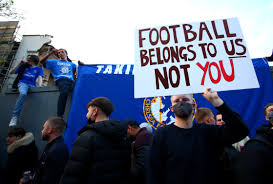February 23 – In a massive shakeup of the governance of English professional football, an independent regular has been confirmed by the government with widespread powers to ensure the financial sustainability of clubs – and, crucially, stop teams from joining any breakaway European Super League.
Once made law, the regulator would also have the authority to license and sanction clubs, stop unscrupulous owners and prevent historic clubs going out of business.
A long-awaited white paper, which has received cross-party support, comes in response to 10 recommendations from a Fan-Led Review of Football Governance chaired by former sports minister Tracey Crouch in 2021.
“The English game remains one of the UK’s greatest cultural exports, with clubs and leagues around the world modelling themselves on its success,” the government said before its white paper on football governance – outlining the proposed legislation – is released today.
“That is why the government is today taking the necessary and targeted steps to ensure that continues for generations.”
The main purposes of the proposed new regulator will be:
– Stopping English clubs from joining closed-shop competitions, which are judged to harm the domestic game
– Preventing a repeat of financial failings seen at numerous clubs
– Introducing a more stringent owners’ and directors’ test to protect clubs and fans
– Giving fans power to stop owners changing a club’s name, badge and traditional kit colours
– Ensuring a fair distribution of money filters down the English football pyramid from the Premier League
“The regulator will have the power to prevent English clubs from joining new competitions that do not meet a predetermined criteria, in consultation with the FA and fans,” said the government.
“That criteria could include measures to stop clubs participating in closed-shop breakaway competitions which harm the domestic game, such as the European Super League.”
A new licensing system would require every club – from the Premier League to the National League just below League Two – to prove it has a sustainable business model. If clubs are not granted a license by the regulator, they will not be allowed to compete.
Moves by owners that may prove controversial – such as changing the name, badge and traditional kit colours, or moving stadium – will not be allowed to be made before consulting fans. It will “put fans back at the heart of how football is run”, says the government.
There will also be a more stringent owners’ and directors’ test that will ensure “good custodians of clubs, stronger due diligence on sources of wealth and a requirement for robust financial planning”.
The introduction of a regulator is regarded as one of the most radical transformations of the game’s governance in the history of the English game.
Prime Minister Rishi Sunak said the “bold new plans” would put fans “back at the heart of football”.
“Since its inception over 165 years ago, English football has been bringing people together, providing a source of pride for communities and inspiration to millions of fans across the country,” he said.
“Yet despite the success of the sport both at home and abroad, we know that there are real challenges which threaten the stability of clubs both big and small. The new plans will protect the rich heritage and traditions of our much-loved clubs and safeguard the beautiful game for generations to come.”
Although the Premier League, launched in 1992, has been an unprecedented financial success, lower down the English pyramid the situation has been in constant turmoil. No fewer than 64 clubs have entered administration since then, even former English champions Derby County being on the brink of liquidation last year.
Kevin Miles, chief executive of the Football Supporters’ Association, said the move “clearly addresses our key concerns around ownership, rogue competitions and sustainability. We support any proposals that offer fans a greater voice in the running of their clubs.”
The Premier League was more cautious saying it was important that the “vital regulation does not damage the game or its ability to attract investment and grow interest.”
A statement added, tellingly, that the league would work “constructively” with stakeholders to ensure the regulator “does not lead to any unintended consequences that could affect the Premier League’s position as the most-watched football league in the world” as a result of England becoming the “first major nation to make football a government-regulated industry”.
The English Football League gave a far stronger endorsement of the proposals.
“The EFL has been clear that the English game needs a fundamental financial reset in order make the game sustainable,” a statement read.
“The white paper represents a once-in-a-generation opportunity that must be seized to address the systemic issues that football has been unable to sort itself over the last 30 years.”
Contact the writer of this story at moc.l1722043467labto1722043467ofdlr1722043467owedi1722043467sni@w1722043467ahsra1722043467w.wer1722043467dna1722043467

